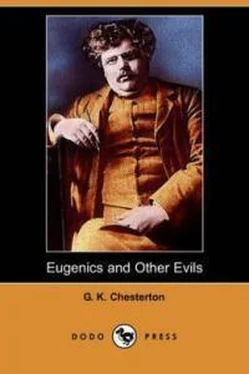Гилберт Честертон - Eugenics and Other Evils
Здесь есть возможность читать онлайн «Гилберт Честертон - Eugenics and Other Evils» весь текст электронной книги совершенно бесплатно (целиком полную версию без сокращений). В некоторых случаях можно слушать аудио, скачать через торрент в формате fb2 и присутствует краткое содержание. Год выпуска: 2014, Издательство: epubBooks Classics, Жанр: Публицистика, на английском языке. Описание произведения, (предисловие) а так же отзывы посетителей доступны на портале библиотеки ЛибКат.
- Название:Eugenics and Other Evils
- Автор:
- Издательство:epubBooks Classics
- Жанр:
- Год:2014
- ISBN:нет данных
- Рейтинг книги:4 / 5. Голосов: 1
-
Избранное:Добавить в избранное
- Отзывы:
-
Ваша оценка:
- 80
- 1
- 2
- 3
- 4
- 5
Eugenics and Other Evils: краткое содержание, описание и аннотация
Предлагаем к чтению аннотацию, описание, краткое содержание или предисловие (зависит от того, что написал сам автор книги «Eugenics and Other Evils»). Если вы не нашли необходимую информацию о книге — напишите в комментариях, мы постараемся отыскать её.
Eugenics and Other Evils — читать онлайн бесплатно полную книгу (весь текст) целиком
Ниже представлен текст книги, разбитый по страницам. Система сохранения места последней прочитанной страницы, позволяет с удобством читать онлайн бесплатно книгу «Eugenics and Other Evils», без необходимости каждый раз заново искать на чём Вы остановились. Поставьте закладку, и сможете в любой момент перейти на страницу, на которой закончили чтение.
Интервал:
Закладка:
I hold it clear, therefore, if anything is clear about the business, that the Eugenists do not merely mean that the mass of common men should settle each other's marriages between them; the question remains, therefore, whom they do instinctively trust when they say that this or that ought to be done. What is this flying and evanescent authority that vanishes wherever we seek to fix it? Who is the man who is the lost subject that governs the Eugenist's verb? In a large number of cases I think we can simply say that the individual Eugenist means himself, and nobody else. Indeed one Eugenist, Mr. A.H. Huth, actually had a sense of humour, and admitted this. He thinks a great deal of good could be done with a surgical knife, if we would only turn him loose with one. And this may be true. A great deal of good could be done with a loaded revolver, in the hands of a judicious student of human nature. But it is imperative that the Eugenist should perceive that on that principle we can never get beyond a perfect balance of different sympathies and antipathies. I mean that I should differ from Dr. Saleeby or Dr. Karl Pearson not only in a vast majority of individual cases, but in a vast majority of cases in which they would be bound to admit that such a difference was natural and reasonable. The chief victim of these famous doctors would be a yet more famous doctor: that eminent though unpopular practitioner, Dr. Fell.
To show that such rational and serious differences do exist, I will take one instance from that Bill which proposed to protect families and the public generally from the burden of feeble–minded persons. Now, even if I could share the Eugenic contempt for human rights, even if I could start gaily on the Eugenic campaign, I should not begin by removing feeble–minded persons. I have known as many families in as many classes as most men; and I cannot remember meeting any very monstrous human suffering arising out of the presence of such insufficient and negative types. There seem to be comparatively few of them; and those few by no means the worst burdens upon domestic happiness. I do not hear of them often; I do not hear of them doing much more harm than good; and in the few cases I know well they are not only regarded with human affection, but can be put to certain limited forms of human use. Even if I were a Eugenist, then I should not personally elect to waste my time locking up the feeble–minded. The people I should lock up would be the strong–minded. I have known hardly any cases of mere mental weakness making a family a failure; I have known eight or nine cases of violent and exaggerated force of character making a family a hell. If the strong–minded could be segregated it would quite certainly be better for their friends and families. And if there is really anything in heredity, it would be better for posterity too. For the kind of egoist I mean is a madman in a much more plausible sense than the mere harmless "deficient"; and to hand on the horrors of his anarchic and insatiable temperament is a much graver responsibility than to leave a mere inheritance of childishness. I would not arrest such tyrants, because I think that even moral tyranny in a few homes is better than a medical tyranny turning the state into a madhouse. I would not segregate them, because I respect a man's free–will and his front–door and his right to be tried by his peers. But since free–will is believed by Eugenists no more than by Calvinists, since front–doors are respected by Eugenists no more than by house–breakers, and since the Habeas Corpus is about as sacred to Eugenists as it would be to King John, why do not they bring light and peace into so many human homes by removing a demoniac from each of them? Why do not the promoters of the Feeble–Minded Bill call at the many grand houses in town or country where such nightmares notoriously are? Why do they not knock at the door and take the bad squire away? Why do they not ring the bell and remove the dipsomaniac prize–fighter? I do not know; and there is only one reason I can think of, which must remain a matter of speculation. When I was at school, the kind of boy who liked teasing half–wits was not the sort that stood up to bullies.
That, however it may be, does not concern my argument. I mention the case of the strong–minded variety of the monstrous merely to give one out of the hundred cases of the instant divergence of individual opinions the moment we begin to discuss who is fit or unfit to propagate. If Dr. Saleeby and I were setting out on a segregating trip together, we should separate at the very door; and if he had a thousand doctors with him, they would all go different ways. Everyone who has known as many kind and capable doctors as I have, knows that the ablest and sanest of them have a tendency to possess some little hobby or half–discovery of their own, as that oranges are bad for children, or that trees are dangerous in gardens, or that many more people ought to wear spectacles. It is asking too much of human nature to expect them not to cherish such scraps of originality in a hard, dull, and often heroic trade. But the inevitable result of it, as exercised by the individual Saleebys, would be that each man would have his favourite kind of idiot. Each doctor would be mad on his own madman. One would have his eye on devotional curates; another would wander about collecting obstreperous majors; a third would be the terror of animal–loving spinsters, who would flee with all their cats and dogs before him. Short of sheer literal anarchy, therefore, it seems plain that the Eugenist must find some authority other than his own implied personality. He must, once and for all, learn the lesson which is hardest for him and me and for all our fallen race—the fact that he is only himself.
We now pass from mere individual men who obviously cannot be trusted, even if they are individual medical men, with such despotism over their neighbours; and we come to consider whether the Eugenists have at all clearly traced any more imaginable public authority, any apparatus of great experts or great examinations to which such risks of tyranny could be trusted. They are not very precise about this either; indeed, the great difficulty I have throughout in considering what are the Eugenist's proposals is that they do not seem to know themselves. Some philosophic attitude which I cannot myself connect with human reason seems to make them actually proud of the dimness of their definitions and the uncompleteness of their plans. The Eugenic optimism seems to partake generally of the nature of that dazzled and confused confidence, so common in private theatricals, that it will be all right on the night. They have all the ancient despotism, but none of the ancient dogmatism. If they are ready to reproduce the secrecies and cruelties of the Inquisition, at least we cannot accuse them of offending us with any of that close and complicated thought, that arid and exact logic which narrowed the minds of the Middle Ages; they have discovered how to combine the hardening of the heart with a sympathetic softening of the head. Nevertheless, there is one large, though vague, idea of the Eugenists, which is an idea, and which we reach when we reach this problem of a more general supervision.
It was best presented perhaps by the distinguished doctor who wrote the article on these matters in that composite book which Mr. Wells edited, and called "The Great State." He said the doctor should no longer be a mere plasterer of paltry maladies, but should be, in his own words, "the health adviser of the community." The same can be expressed with even more point and simplicity in the proverb that prevention is better than cure. Commenting on this, I said that it amounted to treating all people who are well as if they were ill. This the writer admitted to be true, only adding that everyone is ill. To which I rejoin that if everyone is ill the health adviser is ill too, and therefore cannot know how to cure that minimum of illness. This is the fundamental fallacy in the whole business of preventive medicine. Prevention is not better than cure. Cutting off a man's head is not better than curing his headache; it is not even better than failing to cure it. And it is the same if a man is in revolt, even a morbid revolt. Taking the heart out of him by slavery is not better than leaving the heart in him, even if you leave it a broken heart. Prevention is not only not better than cure; prevention is even worse than disease. Prevention means being an invalid for life, with the extra exasperation of being quite well. I will ask God, but certainly not man, to prevent me in all my doings. But the decisive and discussable form of this is well summed up in that phrase about the health adviser of society. I am sure that those who speak thus have something in their minds larger and more illuminating than the other two propositions we have considered. They do not mean that all citizens should decide, which would mean merely the present vague and dubious balance. They do not mean that all medical men should decide, which would mean a much more unbalanced balance. They mean that a few men might be found who had a consistent scheme and vision of a healthy nation, as Napoleon had a consistent scheme and vision of an army. It is cold anarchy to say that all men are to meddle in all men's marriages. It is cold anarchy to say that any doctor may seize and segregate anyone he likes. But it is not anarchy to say that a few great hygienists might enclose or limit the life of all citizens, as nurses do with a family of children. It is not anarchy, it is tyranny; but tyranny is a workable thing. When we ask by what process such men could be certainly chosen, we are back again on the old dilemma of despotism, which means a man, or democracy which means men, or aristocracy which means favouritism. But as a vision the thing is plausible and even rational. It is rational, and it is wrong.
Читать дальшеИнтервал:
Закладка:
Похожие книги на «Eugenics and Other Evils»
Представляем Вашему вниманию похожие книги на «Eugenics and Other Evils» списком для выбора. Мы отобрали схожую по названию и смыслу литературу в надежде предоставить читателям больше вариантов отыскать новые, интересные, ещё непрочитанные произведения.
Обсуждение, отзывы о книге «Eugenics and Other Evils» и просто собственные мнения читателей. Оставьте ваши комментарии, напишите, что Вы думаете о произведении, его смысле или главных героях. Укажите что конкретно понравилось, а что нет, и почему Вы так считаете.








